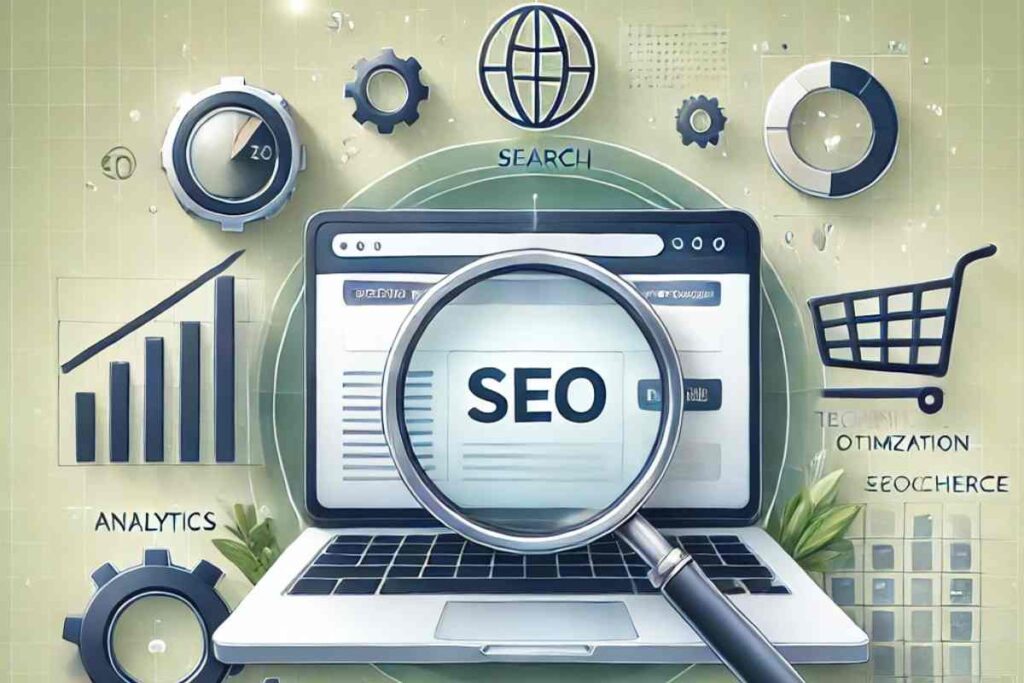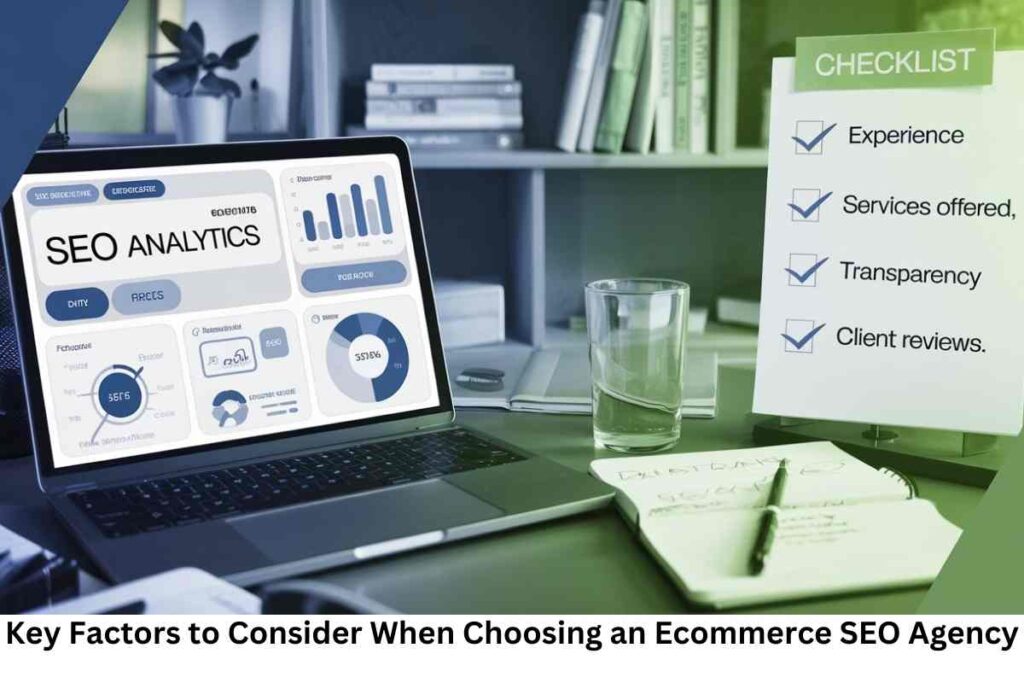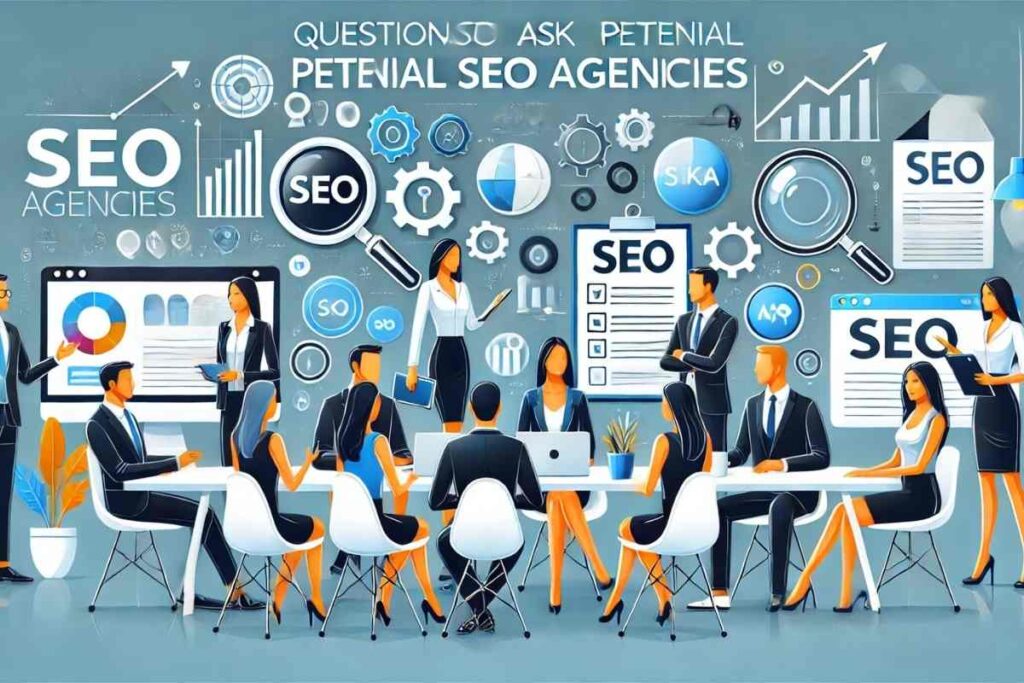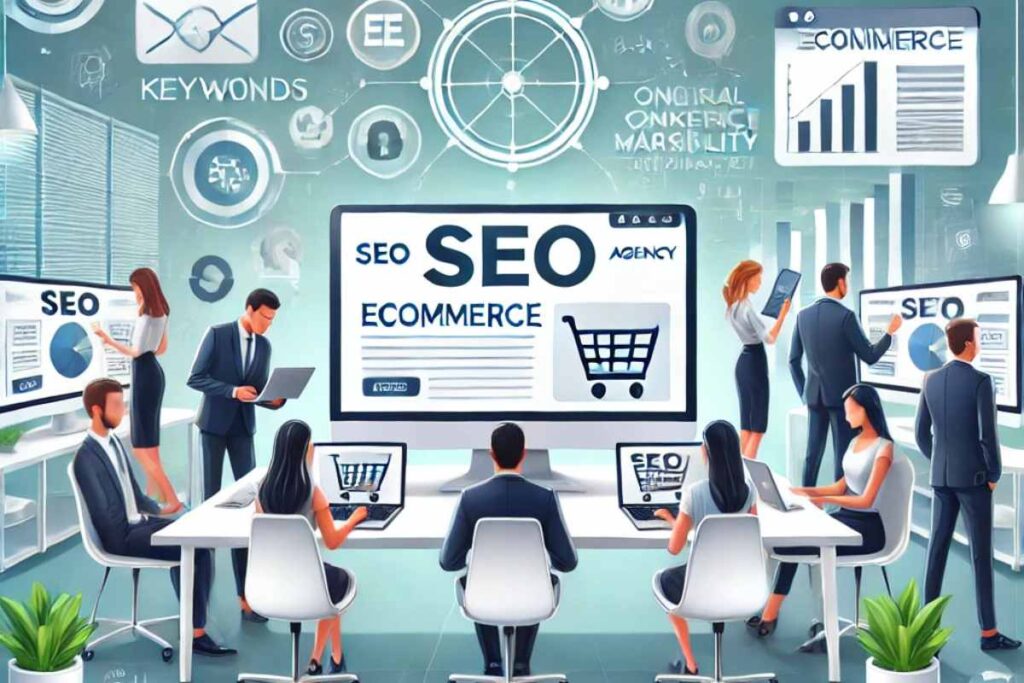Search engine optimization (SEO) is essential for ecommerce websites to attract organic traffic, boost visibility, and increase sales. By optimizing keywords, content, and technical elements, ecommerce businesses can rank higher in search engine results, making them more accessible to potential customers.
Effective SEO enhances brand recognition, draws high-quality traffic, and supports growth across various customer journey stages. For ecommerce stores, investing in SEO is a cost-effective way to gain a competitive edge and improve online performance.
In this article, we explore how to choose the right ecommerce SEO agency by covering key selection factors, essential services, and advanced SEO strategies to boost your store’s visibility and growth.
Understanding Your Ecommerce SEO Needs

Before selecting an SEO agency, it’s essential to assess your unique ecommerce SEO needs. This includes conducting a thorough analysis of your target audience and reviewing competitor strategies.
Target Audience Analysis
- Importance: Identifying your target audience is the cornerstone of a successful ecommerce SEO strategy.
- Key Questions: Determine if there’s demand for your products, if your audience can afford your offerings, and how frequently they can buy from you.
- Benefits: Understanding customer desires, values, and preferences allows you to create personalized experiences.
- Methods: Collect demographic and psychographic data via surveys, interviews, and market research to understand your audience better.
Competitor Research
- Significance: Analyzing competitors reveals industry trends and keywords that drive conversions.
- Approach: Identify “money keywords,” review competitor rankings, and find gaps in your competitors’ content to refine your SEO approach.
- Benefits: Competitor analysis helps target the right keywords, identify market gaps, and develop a refined SEO strategy that keeps you competitive in the ecommerce landscape.
Key Factors to Consider When Choosing an Ecommerce SEO Agency

Selecting the right agency is critical to your SEO success. Here are some factors to evaluate:
1. Experience and Expertise in Ecommerce
- Importance: An agency experienced in ecommerce SEO understands specific industry challenges and opportunities.
- What to Look For: Seek agencies with a track record in ecommerce, proven success in enhancing visibility and search rankings, and expertise in key ecommerce platforms like Shopify or WooCommerce.
2. Comprehensive Service Offering
- Core Services: Look for essential services, including on-page SEO, off-page strategies, and technical SEO audits.
- Customization: Choose an agency that tailors its services to your unique ecommerce needs and goals rather than offering one-size-fits-all solutions.
3. Case Studies and Client Reviews
- Validation: Case studies and testimonials help you understand an agency’s success rate and client satisfaction.
- Evidence of Success: Look for proven improvements in rankings, organic traffic, and sales in their previous projects.
Why Choose RTEETech for Ecommerce SEO?
- Client Success Focus: Track record of improving rankings, traffic, and sales for clients.
- Proven Expertise: Extensive experience in ecommerce SEO strategies tailored for various industries.
- Customized Solutions: Personalized SEO plans that align with your unique business goals.
- Comprehensive Services: Full range of services including on-page, off-page, and technical SEO.
- Data-Driven Approach: Utilizes analytics to refine strategies and ensure measurable results.
- Transparent Communication: Regular updates and reports to keep you informed of progress.
Questions to Ask Potential SEO Agencies

Choosing the right agency involves asking questions that give you insight into their approach, communication style, and transparency. Here’s a list of questions to consider:
Pricing and Packages
Importance: Understanding the pricing model (monthly, hourly, or project-based) and what’s included in each package helps you evaluate value for money.
Suggested Questions: Ask for a breakdown of services, hidden fees, and examples of similar work in your niche.
Reporting and Communication
Significance: Transparent communication and regular reporting are essential for tracking progress and understanding ROI.
Key Inquiries: Find out how often reports are provided, the types of metrics tracked, and how communication will be maintained.
Customization and Strategy Alignment
Importance: Custom strategies ensure that SEO efforts align with your business goals.
Questions to Ask: Discuss the agency’s process for creating tailored strategies and ask for specific examples of how they’ve adapted strategies based on client needs.
Tips for Evaluating SEO Agency Proposals
When assessing agency proposals, it’s important to consider factors that directly impact the success of your SEO efforts ecommerce seo agency
Goal Alignment and Strategic Fit
Why It Matters: Ensuring the proposed SEO strategies align with your specific goals (e.g., increasing traffic, conversions, or sales) is crucial for achieving results.
Evaluation: Assess how well the proposed strategy aligns with your objectives and whether it addresses your unique business needs.
Transparency and Accountability
Significance: Transparency in communication and a clear accountability framework create a solid foundation for a successful partnership.
What to Look For: Clear reporting structures, regular updates on progress, and a commitment to being accountable for outcomes..
Advanced SEO Tips to Strengthen Your Ecommerce Strategy
Optimize for Mobile and Page Speed
With more shoppers browsing on mobile, ensure that your site is mobile-friendly and has a fast loading speed. Google prioritizes fast-loading, mobile-friendly sites in its rankings.
Incorporate Structured Data for Rich Snippets
Use schema markup for products, FAQs, and reviews to make your content eligible for rich snippets, which can improve visibility and click-through rates on search results pages.
Use Visual Content and Case Studies
Including visuals such as infographics and tables makes the content more engaging. Add case studies or real-world examples to build credibility and retain reader interest.
Track Key SEO Metrics
To measure success, track the following:
- Organic Traffic Growth – % increase in monthly visits.
- Keyword Ranking Improvements – Tracking movement of targeted keywords.
- Conversion Rate from Organic Search – % of visitors who make a purchase.
- Click-Through Rate (CTR) – Percentage of users clicking your search result.
Beware of These SEO Agency Red Flags
Guaranteed #1 Rankings on Google – No agency can promise specific rankings, as Google’s algorithm is unpredictable.
Lack of Transparency in Reporting – Agencies should provide real-time data and clear insights into performance.
Outdated SEO Practices – Avoid agencies using keyword stuffing, link farms, or other black-hat SEO techniques.
Conclusion
Choosing the right ecommerce SEO agency is a crucial step for the success of your online store. By focusing on target audience analysis, conducting competitor research, and considering essential factors like agency experience, service offerings, and transparent communication, you can make an informed choice that drives impactful results. Remember, the ecommerce landscape is constantly evolving. Staying customer-focused and adaptable is key to long-term growth and success in this dynamic field.
By following these guidelines, you can partner with an agency that aligns with your goals and ensures your business stands out in the competitive ecommerce seo agency.
FAQS
How Can an Ecommerce SEO Agency Improve My Online Store’s Visibility?
By optimizing product pages, improving site speed, and building backlinks to increase your site’s ranking on search engines.
What Should I Look for When Choosing an Ecommerce SEO Agency?
Experience in ecommerce SEO, proven results, transparent reporting, and custom strategy alignment with your business goals.
How Much Does It Cost to Hire an Ecommerce SEO Agency?
Costs vary widely, from $1,000 to $10,000+ monthly, depending on the agency’s expertise and the services provided.
How Long Does It Take to See Results from Ecommerce SEO?
Typically, you’ll see noticeable improvements in 3-6 months, though results depend on the industry and initial SEO status.
What Services Should an Ecommerce SEO Agency Offer?
On-page, off-page, technical SEO, keyword research, and mobile optimization, along with content creation and possibly conversion rate optimization.
How Do I Measure the Success of My Ecommerce SEO Efforts?
Success is tracked by metrics like organic traffic, keyword rankings, bounce rate, and conversions, reported regularly by your agency.
Why Is Competitor Analysis Important in Ecommerce SEO?
It reveals effective keywords and strategies in your niche, helping your agency refine your SEO approach to target gaps.
Can an SEO Agency Help with Local SEO for Ecommerce?
Yes, agencies can optimize for local searches, set up Google My Business, and build local links for stores with physical locations.



